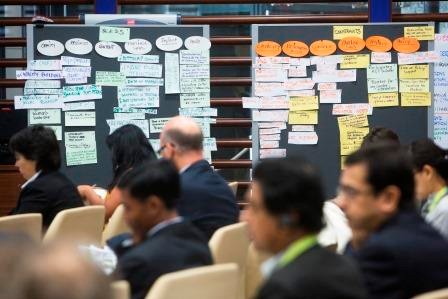 In the framework of the International Year of Family Farming 2014 (IYFF), FAO Office for Partnerships, Advocacy and Capacity Development convened a Forum on Communication for Development & Community Media for Family Farming (FCCM) in Rome, Italy, on 23-24 October 2014.
In the framework of the International Year of Family Farming 2014 (IYFF), FAO Office for Partnerships, Advocacy and Capacity Development convened a Forum on Communication for Development & Community Media for Family Farming (FCCM) in Rome, Italy, on 23-24 October 2014.The Forum provided the opportunity to share experiences and showcase evidence of the contribution of Communication for Development (ComDev), ICTs and community media to family farming as drivers for innovation and social change in rural areas.
Over 100 participants representing farmer organizations, rural institutions, international agencies, governments, research organizations, development and human rights NGOs, academia, community media and communication networks attended the FCCM.
The starting point for discussion was the definition of Rural Communication Services (RCS) as “a working concept that seeks to frame a wide range of processes, activities, media applications and institutional arrangements that respond in a sustained and inclusive manner to the communication needs of rural populations.”
Participants agreed that sustainable social and economic development begins when farmers, communities and people are empowered to make decisions for their own lives. Hence, communication is key to support family farming and rural development.
The FCCM endorsed and committed to act on a set of recommendations in relation to:
- Enabling policy and institutional frameworks: throughout cross-sectorial alliances to promote and implement law and policy reforms in respect to communication and family farming. Also by providing formal legal recognition for independent and pluralistic community radios.
- Investments and partnership opportunities: in order to build an evidence base for rural communication services and embed them in development initiatives/programmes. Also by urging governments to invest in reinforce community-based communication services.
- Capacity development: both at the level of farmers, by facilitating knowledge/confidence in order to voice their needs and concerns; and at the level of development professionals by developing collaborative learning strategies that link directly to and are inspired by rural realities with special attention to gender, class, age and socio-cultural issues.
In order to move forward the agenda, participants also agreed to establish the FCCM as an informal mechanism to advocate for rural communication policies and services and to steer collaboration among relevant actors.
Read the Final Note which includes FCCM participants’ recommendations and final statement (English, French and Spanish version)
Please also see the photos, presentations and audio-video materials of the FCCM event.
